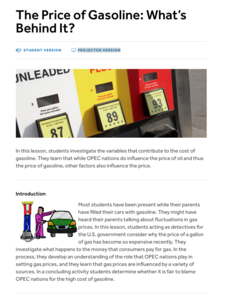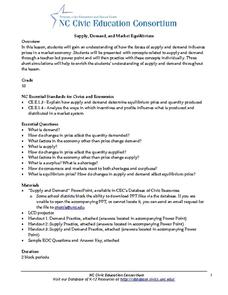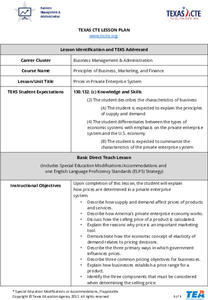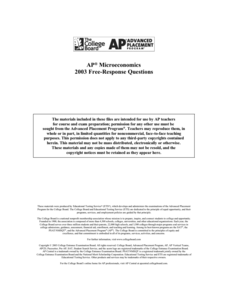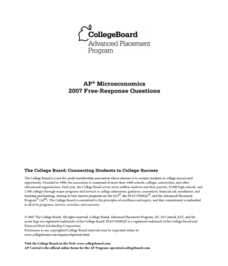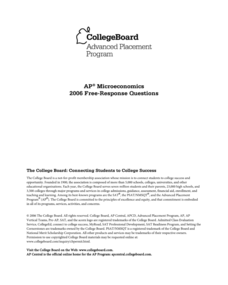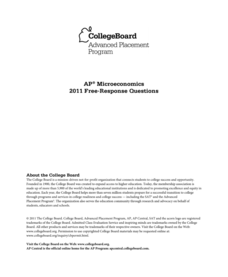Curated OER
The Price of Gasoline: What's Behind It?
When gasoline is in high demand and on short supply, OPEC can raise the price to turn a significant profit. Help learners understand the economics behind demand, profit motive, and monopolies with a lesson that focuses on OPEC and...
Curated OER
The Business of Agriculture
Learners explore the importance of agribusiness in the US economy. They play one game where they sort and discuss the importance of agricultural commodities. They also play the game Pit to better understand how agricultural products are...
Curated OER
Lesson 9: Tracking Commodities
Over the corse of a month, small groups will monitor the price of a specific energy commodity and analyze it in relation to global and domestic events. They play a trade simulation game and create infographics showing what they've...
Curated OER
Equilibrium
Twelfth graders and college students alike work on great practical application problems related to supply and demand with this worksheet series. There are five different worksheets containing graphs, charts, and scenario based problems...
Council for Economic Education
What Do People Want to Wear?
Who doesn't love fashion, especially when it can be applied to economics, supply, demand, market trends, and price equilibrium. Curious young consumers examine market scenarios to determine their effect on the demand and price for...
Carolina K-12
Battle Behind the Pumps
After considering the role that gasoline plays in our lives and our dependence on it as a society, learners participate in a reading activity discussing why oil prices are increasing. They will then simulate being members of a committee...
Carolina K-12
Supply, Demand, and Market Equilibrium
An auction simulation, PowerPoint presentation, and candy M&Ms® are the perfect tools to help your learners understand the concept of supply, demand, and diminishing marginal utility. Here you'll find a thorough lesson plan that...
C3 Teachers
Economics of Slavery: How Did Cotton Sow the Seeds of Panic?
An inquiry-based lesson challenges high schoolers to research and identify the economic forces and inventions that impacted the cotton industry. Researchers consider how the use of slavery impacted the economic growth of the United States.
Carolina K-12
Practice Test of Economics
From scarcity and supply and demand to entrepreneurship and the stock market, here you'll find a multiple-choice assessment that includes 34 questions covering all the major concepts of a traditional economics course.
Carolina K-12
Sample Test: Economics
From scarcity and marginal benefits and costs to economic systems and GDP, this 22-question multiple choice test covers some of the most fundamental concepts of economics.
Texas Education Agency (TEA)
Prices in Private Enterprise System
Learning sure is in demand! Pupils explore the economic principle of supply and demand with a series of engaging, hands-on activities. They practice comparison shopping for a bottle of soda, conduct research on ticket scalping, and...
National WWII Museum
Rationing by the Numbers: Quantitative Data as Evidence
What was it like to live on wartime rations in the United States during World War II? Young historians find out by exploring how those on the home front bought food thanks to the ration system. Other data includes statistics on car sales...
College Board
2003 AP® Microeconomics Free-Response Questions Form B
How are monopolies and competitive firms similar and different? Scholars consider the question using authentic College Board materials. Other prompts consider supply and demand curves and the relationship between wages and output.
College Board
2003 AP® Microeconomics Free-Response Questions
A company producing smoke alarms has a monopoly. However, what factors influence its profit and production? A series of prompts from College Board asks learners to consider the impact. Other practice problems include examining what...
College Board
2004 AP® Microeconomics Free-Response Questions Form B
A company enjoys a monopoly. What happens to its profits when another firm introduces a similar product? Learners consider the case using questions from College Board. Other prompts include the effects of sales taxes and supply and...
College Board
2005 AP® Microeconomics Free-Response Questions
Consumer income drives consumer demand. A set of problems explores what happens to a dairy business when consumers all of a sudden don't have as much money to spend on milk. Other prompts from College Board examine supply and demand...
College Board
2004 AP® Microeconomics Free-Response Questions
All goods have a social cost. A set of questions considers how to best calculate the impact the production of goods has on society. Other practice problems from College Board consider supply-and-demand curves and the impact of licensing...
College Board
2006 AP® Microeconomics Free-Response Questions Form B
What effect could a break-through device have on company's profits? A set of prompts from College Board explores just that question. Other questions consider the role of wages in profit and what factors affect the supply and demand of...
College Board
2007 AP® Microeconomics Free-Response Questions
A monopoly gives a company exclusive rights to a market. What is the impact of that decision on the economy? Problem sets from College Board explore this question, as well as variables in labor markets and government regulations on profit.
College Board
2006 AP® Microeconomics Free-Response Questions
Communities often experience a tug-of-war between a desire for open space and a need for development. How can governmental policy affect each side of the issue? Scholars consider the question, along with queries on pricing and...
College Board
2008 AP® Microeconomics Free-Response Questions Form B
Vaccinations prevent disease, but do they impact anything else? Some may not realize they also have an economic impact. A set of questions from College Board asks learners to consider what, exactly, that impact is. Other practice prompts...
College Board
2010 AP® Microeconomics Free-Response Questions Form B
It's not uncommon to pay a toll to cross a bridge. But what happens to the price of that toll if it's charged to make a profit? Learners use materials from College Board to figure out their answers. Other questions examine issues of...
College Board
2010 AP® Microeconomics Free-Response Questions
When the demand for ethanol goes up, what does that do to corn farmers, who provide a key ingredient? Learners ponder the connection using authentic College Board prompts in preparation for AP® or other exams. Other questions consider...
College Board
2011 AP® Microeconomics Free-Response Questions
The price of avocados is holding steady. What happens when the competition for labor to grow them intensifies? Learners consider this and other questions about supply and demand and the effects of monopolies using authentic College Board...


